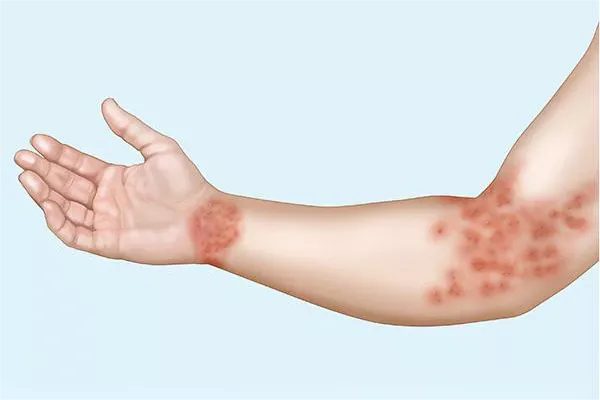Eczema, also known as atopic dermatitis, is a common condition that causes dry, inflamed, and itchy skin. When it affects the face, it can be particularly troublesome due to its visibility. However, with proper treatment and skincare, it is possible to manage and even reduce the symptoms of facial eczema. This article will guide you through the steps to help get rid of eczema on the face, offering tips on how to soothe irritated skin, identify triggers, and maintain healthy skin over time.
Understand What Causes Eczema on the Face
Eczema can occur on various parts of the body, and when it affects the face, it can be due to multiple reasons. The exact cause of eczema is not fully understood, but it is often linked to a combination of genetic and environmental factors. Here are some common causes of facial eczema:
Genetics: If you have a family history of eczema, asthma, or hay fever, you may be more likely to develop eczema.
Immune system response: Eczema is related to an overactive immune response, causing the skin to react to irritants more easily.
Environmental factors: Things like weather changes, humidity, harsh soaps, allergens (such as pollen or dust mites), or certain skincare products can trigger eczema flare-ups.
Understanding the causes of eczema can help in avoiding triggers and choosing the best treatment options.
Signs and Symptoms of Eczema on the Face
The symptoms of eczema on the face can vary from person to person, but the most common signs include:
Redness and inflammation: Eczema often appears as red, inflamed patches on the skin, which can be especially noticeable on the face.
Itchiness: One of the most distressing symptoms is intense itching, which can lead to scratching and worsen the condition.
Dryness and flaking: The skin may become dry and flaky, sometimes peeling or cracking, which can be painful.
Swelling: The affected areas of the face may swell, making the skin look puffy or irritated.
Crusting or oozing: In more severe cases, eczema can cause blisters that may break open and ooze fluid.
If you are experiencing these symptoms, it’s important to take steps to manage and treat the eczema promptly.
Step 1: Moisturize Regularly
Keeping your skin well-moisturized is crucial when treating eczema, especially on the face. Dry skin is a common trigger for eczema flare-ups, so moisturizing helps to lock in hydration and soothe the skin. Here’s how to do it effectively:
Choose the right moisturizer: Look for fragrance-free, hypoallergenic moisturizers that are designed for sensitive skin. Avoid products that contain alcohol, which can dry out the skin.
Use ointments or creams: Ointments or thick creams are often more effective than lotions, as they create a barrier on the skin to prevent moisture loss.
Apply after washing: Moisturize your face immediately after washing to lock in moisture. This helps to keep the skin hydrated and prevent it from drying out.
Hydrate frequently: If your skin feels dry throughout the day, apply moisturizer whenever needed. The more you hydrate, the less likely your skin will become dry or irritated.
A good moisturizer can significantly improve the appearance of eczema on the face by reducing dryness and maintaining the skin’s natural barrier.
Step 2: Use Gentle Skincare Products
When you have eczema on the face, it’s important to be cautious about the products you use. Many skincare products contain ingredients that can irritate sensitive skin and worsen eczema symptoms. Here’s how to choose the right skincare routine:
Use gentle cleansers: Avoid soaps and cleansers that contain harsh chemicals, fragrances, or alcohol. Instead, opt for gentle, soap-free cleansers that are specifically formulated for sensitive skin.
Avoid exfoliating: Exfoliating products can irritate eczema-prone skin. Instead, focus on gentle cleansing and moisturizing.
Avoid fragrances: Fragrance in skincare products can irritate the skin and cause flare-ups. Look for products that are fragrance-free and suitable for eczema.
Test products before use: Before using a new product, do a patch test on a small area of your skin to ensure it won’t cause irritation.
By sticking to gentle skincare products, you can prevent further irritation and maintain the health of your skin while managing eczema.
Step 3: Avoid Scratching
Scratching eczema-affected skin can lead to further irritation, infections, and scarring. Although it can be hard to resist the urge to scratch, especially when the skin is itchy, here are some tips to help avoid scratching:
Keep nails short: Short nails reduce the risk of breaking the skin if you do scratch.
Wear cotton gloves: If you’re prone to scratching in your sleep, wearing cotton gloves can help protect your skin from damage.
Use cold compresses: If itching becomes unbearable, apply a cold compress or ice pack to the area for relief. This can help reduce inflammation and soothe the skin.
Use anti-itch creams: Over-the-counter hydrocortisone creams or calamine lotion can help alleviate itching. However, these should be used sparingly and according to your healthcare provider’s recommendations.
By avoiding scratching, you allow your skin to heal faster and prevent further complications.
Step 4: Identify and Avoid Triggers
Eczema flare-ups on the face can be triggered by various environmental factors. Identifying these triggers is key to preventing future flare-ups. Here are some common triggers to watch out for:
Weather conditions: Cold, dry air or extreme heat can dry out the skin and cause irritation. If you live in an area with harsh weather, consider using a humidifier indoors to maintain moisture in the air.
Allergens: Pollen, dust, pet dander, and mold can all trigger eczema flare-ups. Try to avoid exposure to these allergens by keeping windows closed during high pollen seasons and using an air purifier indoors.
Harsh chemicals: Certain chemicals in cleaning products, makeup, or skin care products can irritate the skin. Choose natural or fragrance-free options and avoid products with alcohol.
Food triggers: In some cases, food allergies or sensitivities can trigger eczema flare-ups. Common food triggers include dairy, nuts, and eggs. If you suspect a food trigger, consult with a doctor to determine which foods to avoid.
Keeping track of potential triggers and avoiding them as much as possible is crucial for managing eczema flare-ups on the face.
Step 5: Use Medications as Directed
In some cases, over-the-counter or prescription medications may be necessary to manage eczema symptoms, especially if the flare-ups are severe. These medications can help reduce inflammation, itching, and redness. Some common options include:
Topical steroids: These are commonly prescribed for eczema and help reduce inflammation. However, they should be used sparingly to avoid side effects such as thinning skin.
Topical calcineurin inhibitors: These are non-steroidal medications that can help reduce inflammation and are often prescribed for sensitive areas like the face.
Antihistamines: These medications can help control itching, especially at night.
Oral steroids: In severe cases, oral steroids may be prescribed to help control flare-ups, but they should be used for short periods due to potential side effects.
It’s important to follow your doctor’s instructions when using these medications and only use them as directed to avoid complications.
Step 6: Consider Natural Remedies
In addition to medical treatments, there are some natural remedies that may help soothe eczema symptoms. While these remedies can provide relief, it’s always a good idea to consult with a healthcare provider before trying them. Some options include:
Coconut oil: Coconut oil has natural moisturizing and anti-inflammatory properties. Applying it to affected areas can help reduce dryness and redness.
Aloe vera: Aloe vera is known for its soothing properties. It can help reduce inflammation and calm irritated skin.
Oatmeal baths: Colloidal oatmeal is often used to soothe dry, itchy skin. Adding it to a bath can provide relief from eczema flare-ups.
Natural remedies can complement medical treatments and provide additional comfort for those dealing with facial eczema.
Step 7: Manage Stress
Stress can be a significant trigger for eczema flare-ups, as it can worsen inflammation and irritate the skin. Learning to manage stress is important for overall skin health. Here are some techniques to reduce stress:
Exercise: Regular physical activity can help reduce stress levels and improve overall health.
Relaxation techniques: Practices like deep breathing, meditation, or yoga can help calm the mind and reduce stress.
Sleep: Ensuring you get enough restful sleep is crucial for managing stress and promoting skin healing.
By managing stress effectively, you can help prevent eczema flare-ups and support the healing process.
Conclusion
Eczema on the face can be challenging, but with the right approach, it can be managed effectively. Moisturizing regularly, using gentle skincare products, identifying triggers, and seeking medical advice when necessary can all contribute to healthier, clearer skin. Patience and consistency are key when dealing with eczema, so give your skin the care it needs to heal and stay protected. If symptoms persist or worsen, consult with a dermatologist to discuss the best treatment options for your specific situation.
Related topics:

























